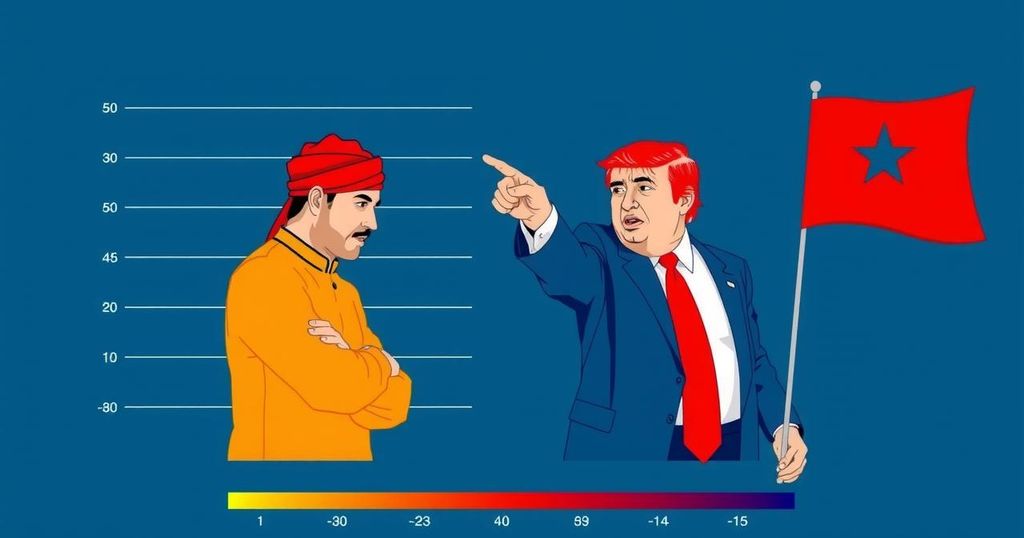Arab-Americans in Michigan Embrace Trump: A Surprising Shift Amid Political Discontent

In Michigan, Arab-Americans are unexpectedly shifting their electoral support toward Donald Trump, spurred by dissatisfaction with the Biden administration’s handling of conflicts in the Middle East and perceptions of cultural imposition by progressive values. This demographic shift highlights the complexities of voter sentiment and could significantly impact the upcoming elections, as these communities look for representation that addresses their concerns.
In a surprising electoral shift, Arab-Americans in Michigan appear to be gravitating towards Donald Trump in the upcoming U.S. elections. These voters have expressed significant disillusionment with the Democratic leadership under President Joe Biden and Vice President Kamala Harris, largely in response to perceived neglect in handling the socio-political unrest in Gaza and Lebanon. The narrative unfolds against the backdrop of Michigan’s unique demographic landscape, particularly in cities like Dearborn and Hamtramck, which boast a significant Arab-American population. Here, many first-time voters and younger citizens are openly favoring Trump despite his historically controversial remarks about immigrants and Muslims. For instance, Jubran Ali, an 18-year-old student, articulated a sentiment of uncertainty regarding the Democratic candidate’s potential impact, stating, “We do not know what she is going to provide, we do not know what she is going to do. So I think it’s just a safer bet to go for Donald Trump.” A pivotal moment came when Mayor Amer Ghalib of Hamtramck, traditionally a Democrat, publicly welcomed Trump’s visit to the city after endorsing him. He cited a combination of disappointment with the current administration’s handling of local and international issues and a glimmer of hope for a different approach under Trump. Ghalib noted, “It is a combination of two things. Disappointment and hope.” Furthermore, a shift towards the Republican side has been articulated not only in sentiments expressed towards Middle Eastern policies but also in cultural values, especially regarding community dynamics. Mayor Ghalib elaborated on the perceived overreach of progressive values that some community members feel have been imposed upon them. In conversations with members of the local community, like Samraa Luqman, their rationale for supporting Trump intertwines issues of foreign policy with domestic discontent. Luqman, who historically supported Democratic candidates, intends to support Trump this time around due to her strong opposition to what she terms “genocide” in Gaza, signaling deep-rooted frustrations with current U.S. policies. “I will still vote for him because one thing I hate more than all those other policies is genocide… And that’s the sentiment of an entire community,” Luqman expressed. As Michigan remains a critical swing state, the ongoing trend of Arab-Americans leaning towards Trump underscores a complex interplay of cultural, political, and emotional factors driving voter behavior. With higher stakes than ever, the implications of these shifts could extend beyond this election cycle, influencing national trends among Arab-American voters.
In the United States, electoral shifts among key demographics can have profound implications on election outcomes. Arab-Americans, particularly in states like Michigan, have historically leaned Democratic. However, recent events have prompted a reevaluation of loyalty, driven by dissatisfaction with both local and national policies regarding Middle Eastern conflicts. This reported trend signifies a broader cultural renegotiation amidst changing political landscapes, highlighting the importance of addressing voters’ concerns seriously to maintain support.
The emerging tendency of Arab-Americans in Michigan to support Donald Trump indicates a significant shift in voter sentiment, driven primarily by disappointment with current Democratic leadership and a belief that change is necessary for addressing cultural and political grievances. As communities articulate their disenchantment regarding both domestic and foreign policy, this electoral pattern could redefine traditional voting blocs within the broader political landscape of the United States. The outcome of such a shift remains critical, not only for Michigan but also for the national political scene as candidates navigate the complexities of voter expectations and community identities.
Original Source: news.sky.com






